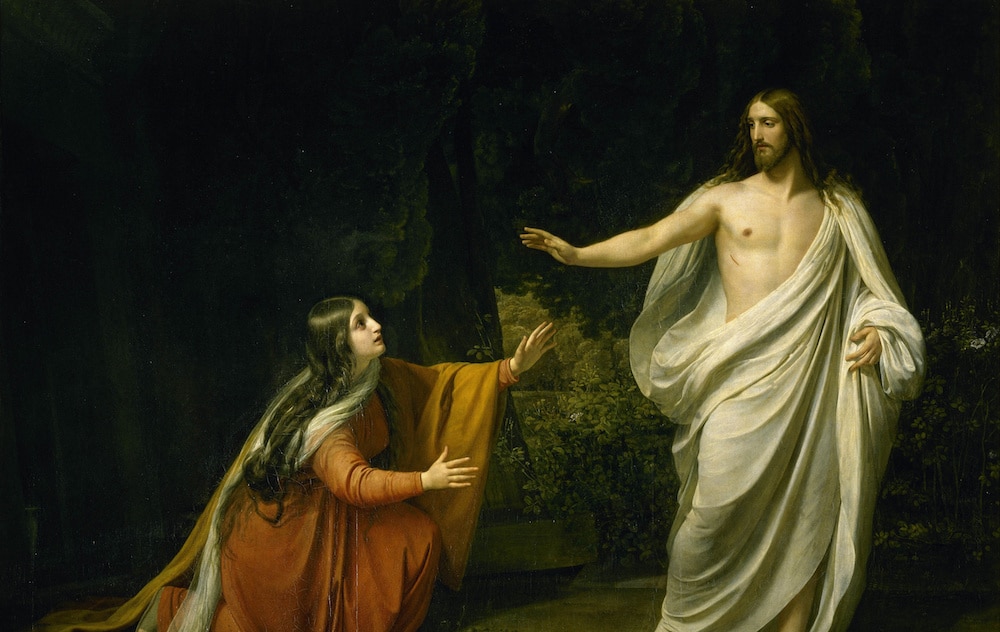Many Catholics arrive at Easter exhausted, having thrown themselves into their Lenten penance. With the 40 days of fasting and prayer behind us, the Easter season is a time of feasting and revelry. The shackles of solemn self-mortification are left behind at the empty tomb. Meat is back on the menu on Friday, and chocolates appear in abundance on once barren kitchen counters and entryway tables.
Easter is a season of rejoicing. In fact, it’s probably one we don’t appreciate enough. The simple fact that the 50 days of the Easter season outnumber the days of Lent are the Church’s way of telling us to take the entire Easter season seriously. We rightly rejoice in Christ’s resurrection and celebrate the new life offered to us on the Eighth Day.
And yet, it seems those celebrations, when approached too casually or without the intentionality the solemnity requires, become occasions of undoing our Lenten growth. There can be a risk here. In the name of conviviality and jubilation, we cannot merely toss aside our Lenten penances unreflectively. Many Catholics are all too willing to abandon the spiritual progress they’ve made during the Lenten season, allowing it to fade in the well-deserved indulgences of Resurrection festivities.
The spiritual life demands constant movement. It is not possible to be merely stagnant. There is only progress or regress, advancement or relapse, forward or backward. This is true even if we undertake the same disciplines every Lent. The spiritual life is like climbing a mountain on a spiraling trail. We don’t head straight to the top. We circle around and around, all the while proceeding to the summit. Along the way, we may glimpse again familiar vistas, but with details and perspectives changing as we continue our journey. The well-worn readings, liturgical customs and penances of Lent can be a routine at once foreign and ever the same. And yet they spur us onward, upward.
This is not to say that we have to keep our Lenten penances at the same degree or in exactly the same fashion. Behavioral psychologists say that it takes, on average, around 66 days for a new habit to stick. So if, for example, you’ve been attending daily Mass during Lent, it’s worth thinking about what life would look like if you continued to regularly attend daily Mass. If you noticed that consuming less media (TV, social media, etc) helped you to improve your prayer life, perhaps continue to curb your media consumption, limiting yourself to nights and/or weekends.
The goal of our Lenten penance is to free us from the things that keep us from God. The goal of the Easter season is to spend these special days with Christ. It is remarkable that, before his ascension, the Lord spent 40 days among his disciples. Theologians say that he does this in part to assure them that he is not a ghost. Forty days is more than enough time to be convinced of the real humanity of someone; to convince the disciples that Jesus had really risen from the dead.
But another reason the Lord spends these days with them is to form them in jubilant Christian living. Jesus teaches the disciples to live the Resurrection well, preparing them to receive the coming gift of the Holy Spirit, which will be poured out on them at Pentecost. Our Easter season, too, must be a time lived well with Christ. Having cast off chains that bind us, we are now freed for the intimacy of fuller life with him.
A favorite homiletic theme of Pope Francis is the invitation of Jesus for the apostles to seek him once more in Galilee. On Easter Sunday, Jesus tells the women who have come seeking him at his tomb: “Do not be afraid. Go tell my brothers to go to Galilee, and there they will see me” (Mt 28:10). The return to Galilee is a return to the place where they first encountered the Lord. But how could it be seen as it once was? In the light of the Resurrection, everything has changed. To return to Galilee means to revisit the moments of grace in our history, finding them transformed by the gift of Christ’s new life.
Easter is not and cannot be a season of unreflective, blind revelry. To celebrate Easter well, we have to revisit the places and graces the Lord has given us in Lent, and find them changed by the grace of hope where there was once none. Do not cast your Lenten progress to the wind. Carry it instead to your Galilee, where you will discover Christ anew, who is our life and our hope.
Our Sunday Visitor Editorial Board: Father Patrick Briscoe, Gretchen R. Crowe, Scott P. Richert, Scott Warden, York Young





